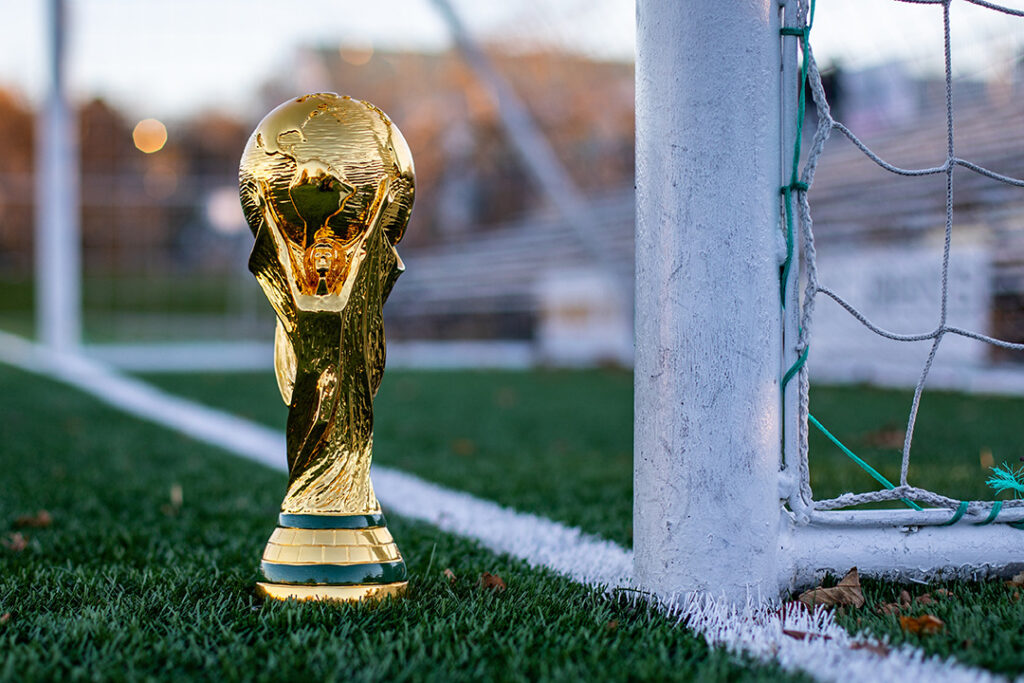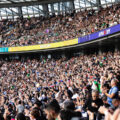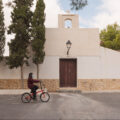Faith and football: Spotlight on Europe
Faith and football: Spotlight on Europe
The 2022 World Cup shed light on not only religion and exploitation in Qatar, but also on Europe’s complex relationship with religion and colonialism.
Qatar faced controversy ever since it was awarded hosting rights for the 2022 World Cup in 2010.[1] The first Middle Eastern country to host the World Cup, it was criticised for human rights violations,[2] especially for its bans on any LGBTQ+ expression and exploitation of migrant workers.[3] But as the World Cup proceeded, the spotlight on religion and abuse began to shine on another issue. Morocco’s fairytale run to the semi-finals shone a light on Europe’s complex relationship with religion, race, and colonialism.
Defeating former colonisers
Many Muslims, both the public and commentators, celebrated Morocco’s football victories as defeats of former colonisers. When Morocco won against Spain[4] and Portugal,[5] the UK-based news outlet Canary observed: “It’s not lost on many that in beating Spain and Portugal, Morocco have defeated two of their former colonisers.”[6] Morocco’s semi-final match against France was also framed this way. “Morocco v France: the battle against colonialism reaches the football pitch,”[7] read one headline. Khaled A. Beydoun, the author of ‘American Islamophobia: Understanding the Roots and Rise of Fear’, explained: “If they defeat France — they’ll win something bigger than the World Cup; the hearts of formerly colonized people everywhere.”[8] Morocco lost the semi-final to France.[9]
Despite this, many framed Morocco’s flight to become the first African nation to reach this stage of the World Cup[10] as representative of an ongoing fight against European colonialism. For example, Morocco’s success led to a surge in support for Palestine.[11] Both Morocco’s players and fans showed solidarity with Palestine during the World Cup. After their victory over Spain, Morocco’s team posed with the Palestinian flag,[12] while Palestinians in the streets of Ramallah hailed Morocco’s victory against Portugal.[13] This prompted Palestinian Football Association chief Jibril Rajoub to declare that the cause of Palestine was not “buried.”[14]
Raised and trained in the former metropole
While many saw Morocco’s success to be a healing of trauma from European colonialism,[15] few recognised that this success was arguably the direct result of what Europe has done since the Second World War. More than half of Morocco’s 26-man squad in Qatar were born in European countries, including Spain, France, the Netherlands, Italy, and Belgium.[16] In need of a labour force to rebuild after the Second World War, European countries recruited immigrants from colonies.[17] France, for example, recruited immigrants from former colonies in Northern Africa, including Morocco.[18] Morocco’s European-born players are children of these immigrants. They trained through Europe’s world-leading football academy system.[19] While many immigrants choose to play for their European nation, like France’s Zinedine Zidane and Kylian Mbappé,[20] some opt to play for the country of their parent or grandparent. FIFA allows players to play for the national team of a country if a parent or grandparent was born in that country.[21] Moroccan players Sofiane Boufal and Romain Saiss are Frenchmen of Moroccan origin.[22] Another two are from Spain, including Achraf Hakimi, who is regarded as one of the world’s best fullbacks.[23]
In search of identity
The reasons why players born to immigrant families choose not to play for the football teams of their native European countries are complex. While some are leaving in search of better opportunities,[24] some are doing it in search of an identity that is cultural, religious, or vernacular.[25] Often, these players are variously Arab, African, or Muslim. Hakimi, for example, explained that: “It was not for anything in particular, but for what I felt, because it was not what I had at home, which is the Arab culture, being Moroccan. I wanted to be here.”[26]
To be sure, this emphasis on a diverse identity does not easily fit with the salience national identity has acquired in post-war Europe. For example, France’s secular nationalism has become increasingly difficult to negotiate for many immigrant communities.[27] President Emanuel Macron’s project against “Islamic separatism” has made it difficult for many Muslim immigrant families to experience a public identity.[28] So while Paris is the incubator of football “talent for the entire world,”[29] it is also a city seeing the quiet flight of Muslims.[30]
The Qatar 2022 World Cup, therefore, shed light on the complex relationship Europe has with religion, race, and colonialism. In the unique way that it unfolded, it became a transnational story of conflicting values, historical traumas, post-war optimism, and the search for a home.
Sources
[1] World Cup 2022: why is Qatar a controversial location for the tournament? | Reuters.
[2] World Cup 2022: why is Qatar a controversial location for the tournament? | Reuters.
[3] Roy Keane offers brutal one-word conclusion on legacy of controversial Qatar World Cup – Mirror Online
[4] Morocco knock out Spain on penalties to reach World Cup quarter-final – as it happened
[5] Tears for Cristiano Ronaldo as 10-man Morocco knock Portugal out of World Cup
[6] Morocco’s support for Palestinians has ‘restored trust’ in the Arab world
[7] Morocco v France: the battle against colonialism reaches the football pitch
[8] Morocco braces for World Cup duel with ex-colonial rulers France
[9] France 2-0 Morocco Live Result: Les Blues reach final! | 14/12/2022 – VAVEL International
[10] Morocco are the first-ever African semifinalists of the World Cup. Here’s what geographical data tell us about this result.
[11] Morocco becomes first African team in World Cup semi-finals as support for Palestine soars
[12] Morocco becomes first African team in World Cup semi-finals as support for Palestine soars
[13] ‘God preserve this score!’ Palestinians revel in Morocco’s World Cup backing
[14] Palestinians say World Cup proves their cause not ‘buried’
[15] These World Cup Wins Are Healing Our Colonial Trauma
[16] More than half of Morocco’s World Cup squad were born abroad. What will their success mean for other African diaspora players? – ABC News
[17] France produces the most World Cup players. Here’s why. – Vox
[18] France produces the most World Cup players. Here’s why. – Vox
[19] France produces the most World Cup players. Here’s why. – Vox
[20] France produces the most World Cup players. Here’s why. – Vox
[21] FIFA national team eligibility: Rules, players who have switched & everything you need to know | Goal.com UK
[22] Morocco and France players, bound by friendship, face off at World Cup – Al-Monitor: Independent, trusted coverage of the Middle East
[23] More than half of Morocco’s World Cup squad were born abroad. What will their success mean for other African diaspora players? – ABC News
[24] More than half of Morocco’s World Cup squad were born abroad. What will their success mean for other African diaspora players? – ABC News
[25] The France-Morocco match is a study in ethnicity and nationality | The Daily Star
[26] More than half of Morocco’s World Cup squad were born abroad. What will their success mean for other African diaspora players? – ABC News
[27] Muslims and the secular city: How right-wing populists shape the French debate over Islam
[28] Amid a crackdown on ‘separatism’, how do French Muslims feel? | Religion | Al Jazeera
[29] France produces the most World Cup players. Here’s why. – Vox
[30] The Quiet Flight of Muslims From France – The New York Times






